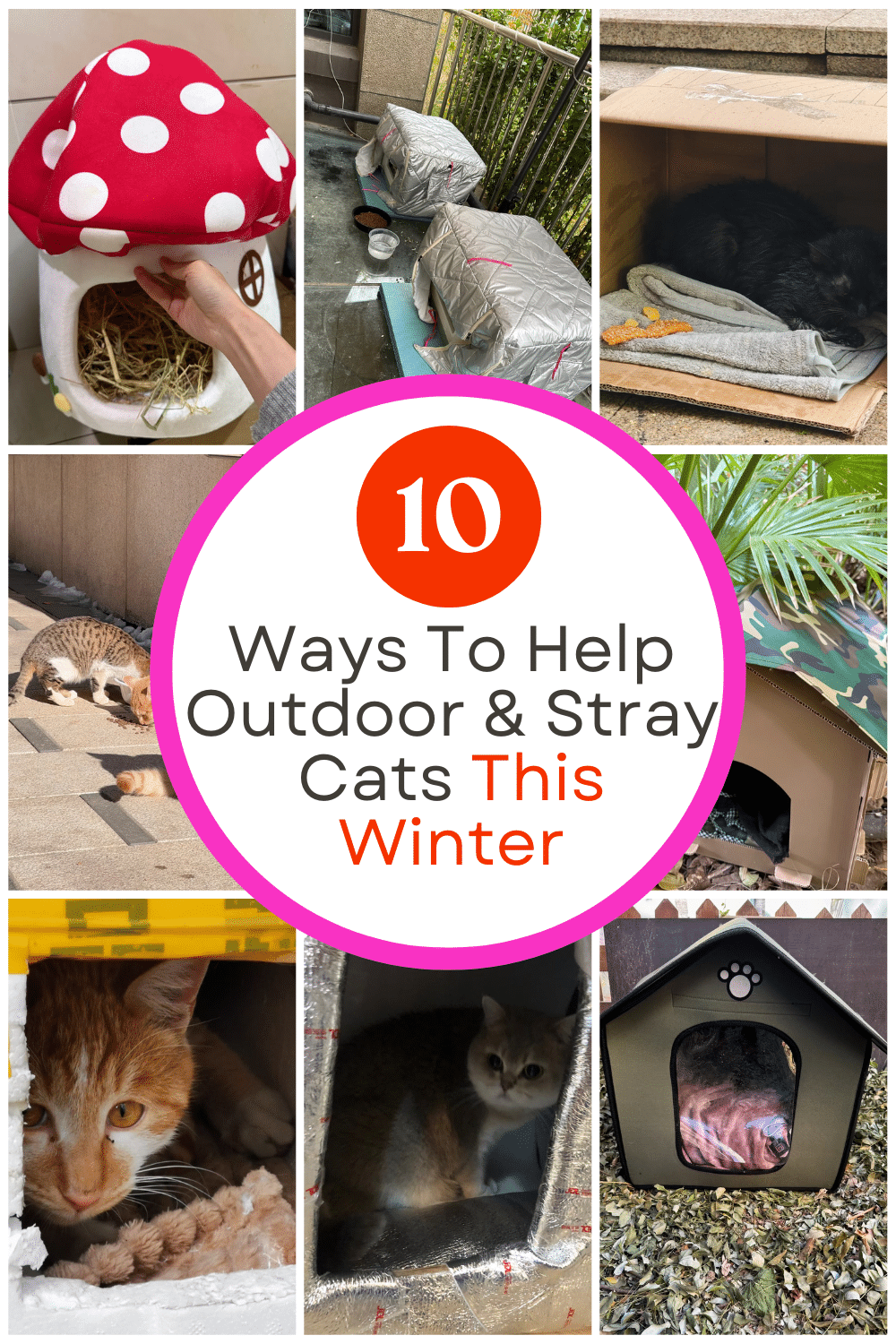Winter can be brutal for outdoor and stray cats, who lack the comfort of a warm home. As temperatures drop, these resilient creatures face challenges most of us can’t imagine. But you can make a difference. Whether you’re an animal lover or someone who simply wants to give back this season, here are 10 practical ways to ensure our feline friends survive—and thrive—during the harsh winter months.

Provide an insulated shelter.
A well-insulated shelter is vital to help outdoor cats stay warm and dry in winter. Use straw, not hay, as insulation—straw repels moisture and lets cats burrow for warmth, while hay absorbs water and stays damp.
Check and replenish the straw regularly throughout the season to maintain its effectiveness. Whether building or buying a shelter, prioritize designs with thick walls, small entrances, and elevated bases to retain heat.
Build a feeding station.
Wet food in insulated containers provides outdoor cats with extra calories to generate body heat. A built-in insulated feeding station can prevent food from freezing and make it easier for cats to access.
If a heated dish is not a viable option, try using a thick plastic container or change the water frequently. Some people place a microwavable heating pad under the container to keep it from freezing a little longer.

Provide extra food and water.
It’s also helpful to give feral cats extra food during the winter months. Cats need more calories to stay warm in cold weather, so be sure to leave out a bit more wet or dry food than you would in warmer seasons.
Set a routine.
Help outdoor cats conserve energy by establishing a regular feeding schedule. When cats know when to expect food, they can leave their shelter at the right time, minimizing exposure to the cold and wet. Stick to a consistent time daily to keep them safe and reduce unnecessary energy loss.
Protect the paws.
Cold weather, ice, and de-icing chemicals can wreak havoc on a cat’s paws. For your outdoor cat, apply a thin layer of petroleum jelly or chapstick to their paw pads before they head out. This creates a protective barrier against irritants. When they return, gently wipe their paws clean, towel dry them, and reapply petroleum jelly if needed.
Feral cats are harder to assist directly, but you can still make a difference. Avoid using harsh de-icing chemicals on your property and opt for pet-safe alternatives instead. Also, ensure no anti-freeze is accessible—its sweet taste can attract cats, but even a tiny amount can be fatal if ingested.
Prepare ahead of time for inclement weather.
Before the winter weather hits, it’s important to be prepared. This includes having a designated shelter for feral cats on your property and ensuring that it is well-insulated and protected from wind and moisture. You can also provide straw or blankets inside the shelter for added warmth.
In addition, keep a stock of emergency supplies on hand in case of extreme weather conditions. This could include extra food, water, and blankets. If you have access to electricity, consider using heated water bowls to prevent water from freezing.
Check your car before driving.
During the winter months, outdoor cats may seek shelter under cars or inside engine compartments to stay warm. Before starting your car, make sure to bang on the hood or honk the horn to scare away any sleeping cats. This simple action can prevent serious injuries or even death.
Skip the salt and antifreeze.
Avoid using snow-melting salts or chemicals near outdoor cat colonies. These substances can harm paw pads and are toxic if ingested, either from licking paws or drinking from contaminated puddles. Opt for pet-safe alternatives to keep cats safe during winter.
Moisturize the skin.
Winter can leave cats with dry, itchy skin, but there are ways to keep them comfortable. Feeding wet food helps hydrate from the inside, and adding a small amount of liquid fish oil to their meals can improve skin health.
For severe dryness, consult a vet to rule out underlying issues. Never use human hair or skin products, as they’re too harsh for cats. Regular brushing is also essential—it distributes natural oils, keeping their coat and skin healthier during the colder months.
Involve the neighbors.
Team up with compassionate neighbors to create a feeding schedule or set up temporary shelters. A group effort ensures stray cats get consistent care during winter. Plus, come spring, they’ll help control the local vermin population in return.
